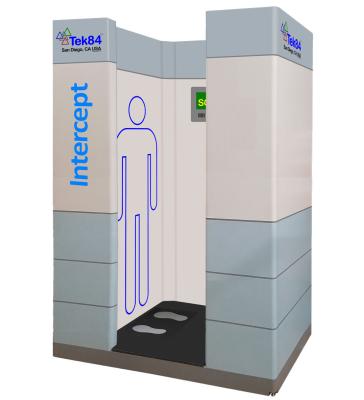Department implements full-body scanners for staff and visitors
It’s no secret that the methods for sneaking dangerous contraband into corrections facilities are creative and everchanging. Children’s toys, religious books, legal documents, trash, food and the human body are but a handful of places smugglers have hidden items over the years.

For that reason, administrators at the Department of Corrections are constantly seeking the latest technology and strategies to make the environment safer for staff and residents.
Effective Aug. 1, 2024, MODOC is using body scanners for staff, visitors, vendors, contractors and volunteers entering adult institutions. The Intercept full-body scanner — manufactured by Tek 84 and already in use for the resident population — are used in conjunction with walk-through metal detectors, hand-held metal detectors and X-ray baggage scanners to keep out weapons, drugs and other prohibited items.
“We’ve always done random staff searches and pat-downs looking for contraband in pockets and elsewhere, but the logistics require a lot of manpower and a lot of time,” said Myles Strid, director of the Division of Adult institutions, “whereas a body scanner gathers information in a few seconds.”
It works like this: Every staff member’s name and employee ID number is entered into the system and stored before body scanner use begins. Each employee, contracted staff member or volunteer entering a front entry search point pushes a random search selector, which determines who is subject to a full-body scan. The person being scanned stands inside the Intercept and remains motionless as the operator initiates a four-second scan. The image displays on the workstation monitor, and the operator inspects the image for concealed objects.
“Being able to see inside the whole body, as opposed to just what’s on the surface, is the key,” said Security Specialist Victor Clevenger. “They also act as a psychological deterrent, discouraging people from bringing in contraband. Staff obviously understand that there have been drug issues within the institutions, and that this is another tool that’s going to help them make the overall environment safer.”
The Intercept machine itself is also safe. It operates as a general-use system under guidelines defined by ANSI/HPS N43.17 (American National Standards Institute / Health Physics Society). Intercept acquires images by using an extremely low level of transmission X-ray.
According to the U.S. Food and Drug Administration (FDA), which regulates the Intercept, the dose from one screening with a general-use X-ray security screening system is so low that a person would have to be screened more than a thousand times in one year in order to exceed the annual radiation dose limit for screening that has been set by expert radiation safety organizations.
“We’re committed to innovating and improving our security practices wherever possible,” Strid said. “Our staff are our best resource, and if they see something or know something or have an idea they think would work, I encourage them to share it with us. This isn’t the last of our security practice upgrades. This is just the start.”
Scanning Start Dates
- August 1, 2024:
Eastern Reception, Diagnostic & Correctional Center (ERDCC), Potosi Correctional Center (PCC), South Central Correctional Center (SCCC), Missouri Eastern Correctional Center (MECC) - September 1, 2024:
Western Diagnostic & Correctional Center (WRDCC), Farmington Correctional Center (FCC), Jefferson City Correctional Center (JCCC), Crossroads Correctional Center (CRCC) - October 1, 2024:
Algoa Correctional Center (ACC), Northeast Correctional Center (NECC), Moberly Correctional Center (MCC), Southeast Correctional Center (SECC) - November 1, 2024:
Tipton Correctional Center (TCC), Boonville Correctional Center (BCC), Fulton Reception & Diagnostic Center (FRDC), Women's Eastern Reception, Diagnostic & Correctional Center (WERDCC) - December 1, 2024: Chillicothe Correctional Center (CCC), Maryville Treatment Center (MTC), Ozark Correctional Center (OCC), Transition Center of Kansas City (TCKC), Transition Center of St. Louis (TCSTL)
